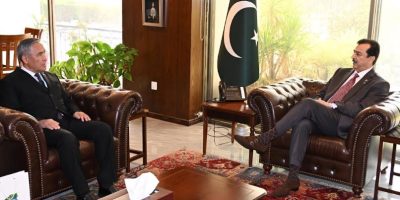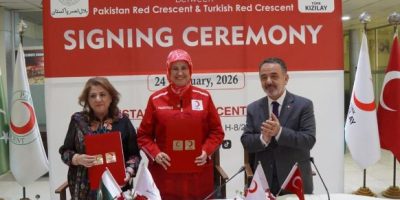Pakistan could be the Opportunity that BiH needs: Ambassador Nedim

After last month’s visit of the Prime Minister of Pakistan, Nawaz Sharif, to BiH opened up a whole range of issues when it comes to cooperation and bilateral relations between the two countries, the Ambassador of BiH in Pakistan, Nedim Makarevic, commented on the current situation.
One of the first things that Ambassador Makarevic noted is the satisfaction of Nawaz Sharif in regards to the visit and reception in our country. He commented on the media reports, which presented the exact opposite. After the visit of the Prime Minister of Pakistan, stories about the Prime Minister not being adequately welcomed in our country were released.
“The media in BiH, as well as 127 media from Pakistan that reported in English and Urdu were very positive when reporting about the visit of Prime Minister Sharif to BiH. There was, however, a single self-proclaimed political analyst who ridiculed Sharif in a 15-minute speech in Urdu, saying that he was not adequately received in Sarajevo, which is nonsense that is not even worthy of attention,” said Makarevic.
He also commented on the fact that the visit of the Prime Minister in Sarajevo was not attended by his colleague, Prime Minister Denis Zvizdic.
“That was the protocol that was agreed in advance. Normal people should understand it. Bakir Izetbegovic was not welcomed by the then president of Pakistan and the Minister of Transportation during his visit to Pakistan in October 2012. The Prime Minister was very satisfied with the visit,” added Makarevic.
This is why Sharif invited Mladen Ivanic, Igor Crnadak and Denis Zvizdic to Pakistan and he hopes that this visit will be carried out as soon as possible in order to make more frequent visits and mutual understanding between two different mentalities and cultural circles.
The problem is, however, the visa regime. Citizens of BiH cannot enter Pakistan without a visa even with a diplomatic passport. Makarevic says that Pakistan has already started working on visa liberalization to allow diplomats as well as ordinary citizens of BiH free entry to this country some 4,000 kilometers away.
Besides the liberalization of the visa regime, Prime Minister Sharif’s visit prompted several specific issues between the two countries. One of them is the agreement on cooperation against terrorism, which unfortunately was not signed because of technical problems. The procedure, according to Makarevic, is complicated meaning a simple agreement could not be signed in such a short period of time. However, Makarevic guarantees that this agreement will eventually be signed.
Given that this is the first visit of the Pakistani official to BiH in almost a decade, the two countries touched on the most important issues and cooperation in the field of trade. Pakistan and BiH are friendly countries and the people of Pakistan consider us as part of Europe which is crucial in terms of economy.
Pakistan is one of the countries which have a successful industry, especially the metal safety equipment industry and sporting goods industry in which Pakistani companies have signed contracts with some of the strongest companies in the field of sports equipment.
“BiH is still considered as a ‘post-war country’ and therefore has many advantages when it comes to exports. Trade exchange with Pakistan is growing from year to year, and this opens the door to many industries. The main appeal is that BiH has a lot to offer, and Pakistan has the means to purchase these assets,” says Makarevic.
Pakistan sees BiH as a gateway to Europe in which they could locate their plants, employ local people and thus BiH would make numerous savings and Pakistan would make a profit. The key problem for Pakistan is small quotas for exports to the EU, and the relocation of certain facilities to BiH would solve this problem.
Makarevic used the example of the metal surgical instruments industry, which flourishes in Pakistan. Pakistan exports instruments to Germany, which sells them to our country at much higher prices. He believes that there is no need for this and that both countries would make more profit if those products would have mark ‘Made in Bosnia’, i.e. if the production was moved to our country.
Courtesy Sarajevo Times
Related News

Gilani recalls Turkmenistan visit, pushes for TAPI pipeline
ISLAMABAD, FEB 25 /DNA/ – Chairman Senate of Pakistan, Syed Yousaf Raza Gilani, received HisRead More

PRCS, TRCS sign MoU, launch Ramadan relief for vulnerable families
ISLAMABAD, FEB 24 /DNA/ – Prof. Dr. Fatma Meriç Yılmaz, President of the Turkish RedRead More


Comments are Closed